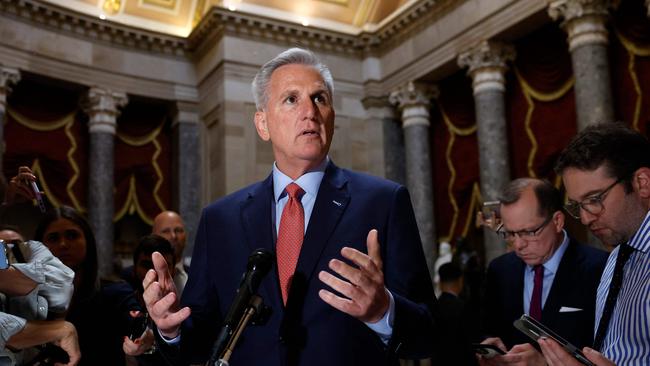US debt-ceiling fight comes down to spending: freeze or cut?
Negotiations are under way to reach an agreement on reining in spending, which has emerged as key to a deal to raise the debt ceiling.

Negotiations were under way on Thursday to reach an agreement on reining in US government spending, which has emerged as the central hurdle to a deal to raise the debt ceiling, with a possible government default just a week away.
US stocks extended declines on Wednesday, reflecting rising anxieties about the debt ceiling, with the Dow Jones Industrial Average posting a fourth-straight session of losses.
The White House has offered a spending freeze for next year, while GOP negotiators have insisted that any deal must result in lower discretionary spending, calling it a critical step in starting to address the country’s growing debt, which now stands at $US31.4 trillion ($48 trillion).
“You have to spend less than you spent last year. That’s not that difficult to do,” House Speaker Kevin McCarthy said. He said there were a number of issues being worked on, with negotiators “able to find some ways that we could probably get to fruition on a couple”.
A top negotiator, Republican Garret Graves, said the administration “thinks they can continue in the future on the same [spending] trajectory. And we’ve made it clear that that’s a nonstarter.”
Democrats say the GOP demand to cut spending is unreasonable, particularly after the White House has signalled it could agree to freeze discretionary spending next year and increase spending by 1 per cent in the fiscal year 2025. Discretionary spending makes up less than one-third of the federal budget, with the balance of the spending on mandatory programs such as Social Security and Medicare, as well as interest on the debt.
White House press secretary Karine Jean-Pierre accused Republicans of holding the country’s economy hostage, called the fight a “manufactured crisis” and said Republicans were unwilling to compromise.
The fight over spending is seen as the main hold-up in talks to raise the debt ceiling. The Treasury Department has warned that the federal government could run out of money to pay all of its bills as soon as June 1 unless congress acts, potentially leading to a default that would rattle markets and sink the economy.
Treasury Secretary Janet Yellen reiterated that the US will soon lack the cash to pay its bills. “It seems almost certain that we will not be able to get past early June,” she said at a Wall Street Journal CEO Council event.
Democrats have criticised Republican negotiators for seeking an increase in military spending even as they are insisting on broader spending cuts. Doing so would break years of precedent where non-defence and defence spending increases are linked.
The GOP also rejected the White House’s proposal to allow Medicare to negotiate the price of a wider range of drugs, a measure the administration pitched as a way to reduce the deficit. Some in the administration are struggling to see a path forward in the talks, according to people familiar with the matter, but officials said negotiators made progress in Thursday’s talks.
A deal on clawing back unused Covid-19 relief funds is largely agreed upon. But the President’s negotiators are resisting Republicans’ push to tighten work requirements for some federal benefits programs after Joe Biden initially signalled openness to the idea, people familiar with the matter said.
Congressional progressives have loudly opposed any bill that includes work requirements.
House Republicans’ starting point in the talks was their Limit, Save, Grow Act of 2023, which narrowly passed the chamber in April. That bill would return the government’s discretionary spending to fiscal year 2022 levels and cap annual spending growth at 1 per cent for a decade.
Mr McCarthy has committed to cutting spending but hasn’t specified a goal of rolling it back to 2022 levels. He has prepared his conference for the likelihood that any deal he strikes with Biden would cut spending by less than what House Republicans passed.
Members of the House Freedom Caucus, founded to use hardball tactics in pursuing conservative goals, say Mr McCarthy shouldn’t accept anything short of the GOP proposal.
Any spending reduction would mark a rare occurrence. In 2011, congress cut discretionary spending to $US1.059 trillion from $US1.085 trillion the year before, according to Office of Management and Budget data, reflecting a debt-ceiling deal during the Obama administration. Discretionary spending has largely marched higher since.
In January, to win the speakership, Mr McCarthy promised conservatives he would seek to return spending to 2022 levels. He also agreed to change House rules to allow any single member to force a vote on ousting him as Speaker, part of concessions that empowered rank-and-file members and could leave Mr McCarthy vulnerable.
Any vote to oust Mr McCarthy – which many Freedom Caucus members and other critics say they aren’t planning – would be unpredictable. A speaker is elected with a majority of all members present and voting. In the 222-213 House, Mr McCarthy could lose no more than four votes and be confident of remaining speaker. Some Democrats have said that they would vote for Mr McCarthy as speaker if it means raising the debt ceiling.
Mr McCarthy’s allies say that he can’t be deterred by whether dissidents will try to oust him. His task is to keep most Republicans behind the eventual agreement and pick up enough Democrats to pass the bill.
“The speaker is doing the right thing. You go negotiate your best deal,” said Kevin Hern, the chairman of the Republican Study Committee, which represents a swath of House conservatives.
The Wall Street Journal



To join the conversation, please log in. Don't have an account? Register
Join the conversation, you are commenting as Logout